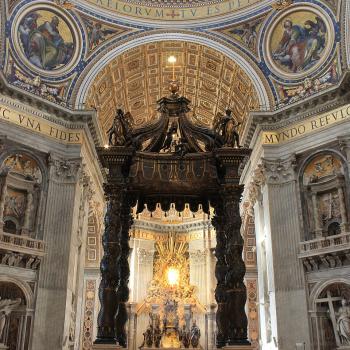This is Holy Week.
It is also the week in which the United States Supreme Court will hear arguments on Proposition 8 and DOMA. The potential is there for a major change in the way American law defines marriage. This could have far-reaching effects which none of us can predict for foresee.
What better week to issue a call to prayer than Holy Week? Tuesday is the day we have the Chrism Mass. Priests renew their vows at this mass and the holy oils which will be used throughout the upcoming year are blessed. It’s a beautiful mass and I urge anyone who can to attend.
History is coming at us so fast it’s hard to keep up. But we need to remember that this week, above all weeks, is a time for extra prayer and penance. I don’t want to make too much of it, but it seems poignant that so many points of history are converging on this one week. Proponents of traditional marriage are also staging a march in Washington, DC on Tuesday.
The cross, which defines this week and the life of the world, is not just a point of history. It is history. The cross is the fulcrum of all history. There was the world before the cross and the world after it, which is to say that there was the world without hope and the world without despair. Despair is impossible to anyone who understands the power of the cross.
We suffer in this life. We experience loss, setbacks, pain, loneliness, failure and grief. But we are never without hope because our hope is in the One who died for us on Calvary.
We need to pray this week, and not just for ourselves and our families, but for all the world that this light of Christ will shine in the darkness of the human heart everywhere.
This article, by our brothers and sisters at The Baptist Press, has details of the upcoming arguments before the Supreme Court:
NASHVILLE (BP) — On Tuesday and Wednesday, the United States Supreme Court will hear arguments in two cases regarding the issue of same-sex marriage. Few issues rise to this level of importance.
These two cases will do much to answer the question for how marriage is going to be viewed in the United States for the foreseeable future. On Tuesday, the court will hear arguments in Hollingsworth v. Perry (Prop. 8). In this case, the court is being asked to decide the fate of Proposition 8 in California. At stake is whether or not the people of California can define marriage in their constitution as only the union of one man and one woman. In a worst-case scenario in deciding Hollingsworth, the court could rule unconstitutional the definition of marriage as only the union of one man and one woman, repudiating two and a quarter centuries of American jurisprudence in which marriage has been defined and regulated by each state, not the federal courts. Every state that has passed such laws would be affected. It would also be going against several millennia of the Judeo-Christian definition of marriage.
On Wednesday, the court will hear arguments in United States v. Windsor. That case deals with the constitutionality of section three of the Defense of Marriage Act (DOMA). The Windsor case creates the possibility that the court could overturn DOMA in its entirety. DOMA is important at many levels. For one, it protects states that do not support same-sex marriage from being required to recognize same-sex marriages that have been performed in states where the practice is legal. For another, it provides a standard definition of marriage for all federal programs, assuring that only heterosexual marriage is recognized across all federal government programs. It also provides protections for federal workers from being forced to violate their consciences regarding marriage. If DOMA is overturned, military chaplains will be especially vulnerable to pressures to accommodate an expanded definition of marriage in their ministries. (Read the rest here.)












